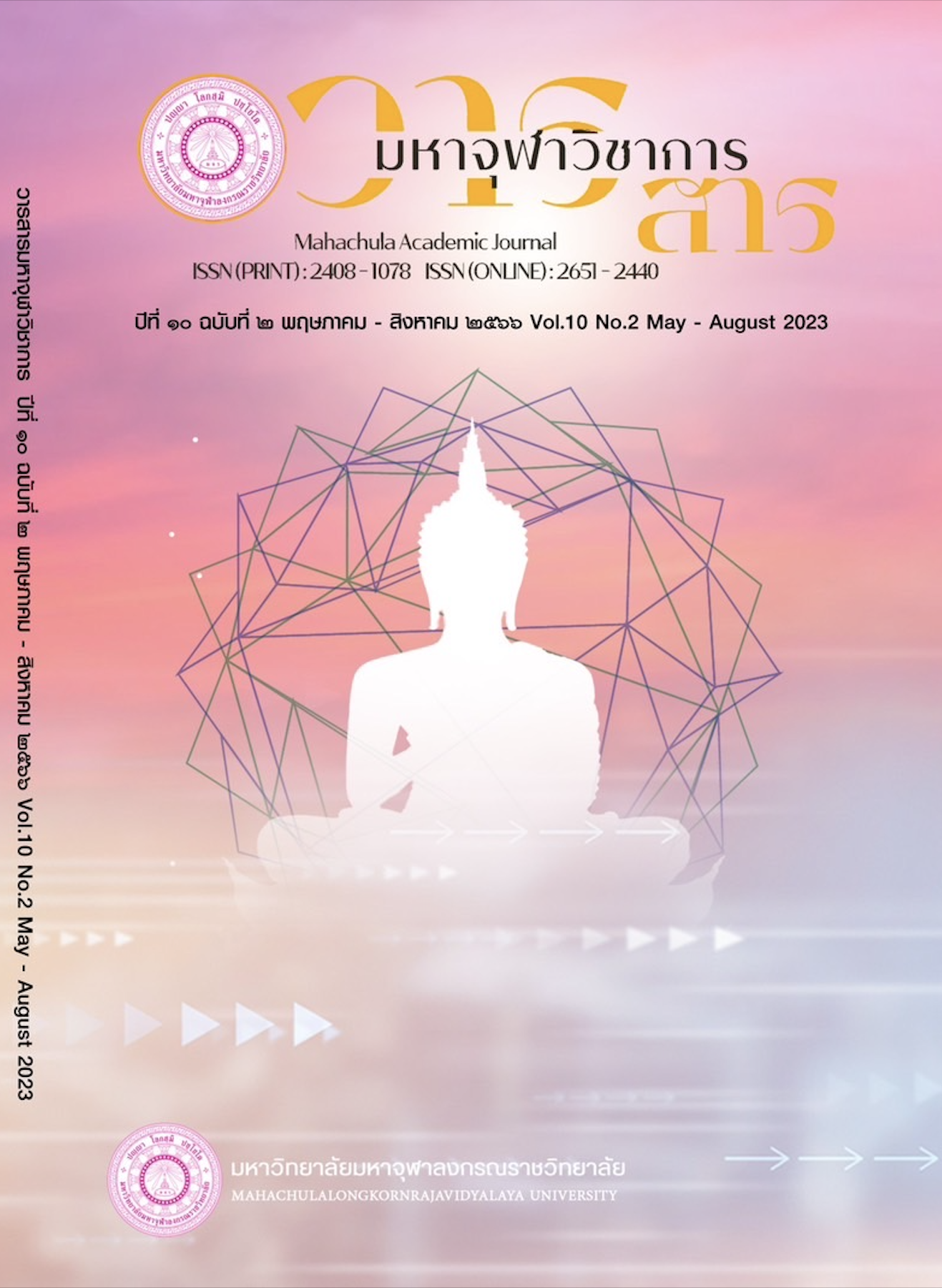Effects of Using Content-based Instruction on English Language of Mattayom 2 Students
Main Article Content
Abstract
The purposes of this research were: (1) to compare learning achievement between before and after learning with activities based on content-based instruction, (2) to study the satisfaction of students with learning activities based on content-based instruction. The research samples were 30 Mathayom 2 students at Bansuandomwitthaya School during the first semester of 2022, selected by cluster random sampling. The research instruments were: 5 lesson plans, English language achievement test, Herbal knowledge test, The measure of student satisfaction. The one group pretest – posttest design was used in the study. The data were analyzed by percentage, mean, standard deviation, and t-test (dependent sample) The research findings were as follows: (1) The posttest mean scores of learning achievement after learning with activities based on content-based instruction on Herb module; Herb for stomach, Herb for muscle, Herb for fever & cough, Herb for health, Herb for apply of Mathayom 2 students were statistically significantly higher than the pretest mean scores at the .05 level. (2) The satisfaction of Mathayom 2 students after learning with activities based on content-based instruction was at highest level. (X̅= 4.74, SD = 0.45)
Article Details

This work is licensed under a Creative Commons Attribution-NonCommercial-NoDerivatives 4.0 International License.
References
กีรติกา มาฆะสุข. “การศึกษาความสามารถทางการอ่านภาษาอังกฤษและผลสัมฤทธิ์ทางการเรียนวิชาสังคมศึกษา ด้วยการสอนภาษาที่เน้นเนื้อหาของนักเรียนชั้นประถมศึกษาปีที่ ๕ หลักสูตร English Program”. วารสารมหาวิทยาราชภัฏยะลา. ปีที่ ๑๔ ฉบับที่ ๓ (กันยายน-ธันวาคม ๒๕๖๒) : ๓๘๙-๓๙๘.
คณะกรรมการพัฒนาการเศรษฐกิจและสังคมแห่งชาติ. ยุทธศาสตร์ชาติระยะ ๒๐ ปี. กรุงเทพมหานคร: สำนักงานคณะกรรมการพัฒนาการเศรษฐกิจและสังคมแห่งชาติ, ๒๕๖๑.
ธัญญวิทย์ วุฒิสว่างวงศ์. “ผลของการสอนที่เน้นเนื้อหาวิชาโดยใช้วิธีสอนแบบซิกซ์ทีที่มีต่อทักษะการนำเสนอ งานด้วยวาจาของนักเรียนระดับชั้นมัธยมศึกษาตอนต้น”. วารสารอิเล็กทรอนิกส์ทางการศึกษา. ปีที่ ๑๒ ฉบับที่ ๓ (กรกฎาคม-กันยายน ๒๕๖๐) : ๓๓๐-๓๔๕.
บุญชม ศรีสะอาด. วิธีการทางสถิติสำหรับการวิจัย. พิมพ์ครั้งที่ ๕. กรุงเทพมหานคร: สุวีริยาสาส์น, ๒๕๕๖.
ลำไย สิงห์สุข. “การสอนภาษาอังกฤษโดยใช้เนื้อหาเป็นสื่อในการจัดการเรียนการสอนนักศึกษาครุศาสตร์”. วารสารรัตนปัญญา. ปีที่ ๕ ฉบับที่ ๑ (มกราคม- มิถุนายน ๒๕๖๓) : ๒๔๙–๒๕๘.
อัศวิน ลิ้มชัยเจริญ. “ผลของการใช้รูปแบบการสอนแบบเน้นเนื้อหาต่อทักษะการพูดภาษาอังกฤษของนักเรียนไทย ระดับชั้นประถมศึกษาตอนปลายที่เรียนภาษาอังกฤษในฐานะที่เป็นภาษาต่างประเทศ”. วารสารอิเล็กทรอนิกส์ทางการศึกษา. ปีที่ ๑๓ ฉบับที่ ๓ (กรกฎาคม - กันยายน ๒๕๖๑) : ๔๙๐-๕๐๓.
Brinton, D. M., M. A. Snow, and M. B. Wesche. Content-Based Second Language Instruction. New York: Newbury House, 1989.
Cronbach, L. J. Essentials of Psychological Test. 5th ed. New York : Harper Collins, 1970.
Krashen, S. D. and Terrell D. T. The Natural Approach: Language Acquisition In The Classroom. Hayward, CA : Alemany Press, 1983.
Littlewood, W. Communication Language Teaching. Cambridge : Cambridge University Press, 1981.
Mohan, B. A. Language and Content : Reading. MA : Addison-Wesley, 1986.
Settlage et al. “Inquiry Science, Sheltered Instruction, and English Language Learners: Conflicting Pedagogies in Highly Diverse Classrooms”. Issues in Teacher Education, Vol.14 No.1 (Spring 2005) : 39-57.
สำนักงานคณะกรรมการการศึกษาแห่งชาติ. ผลการทดสอบทางการศึกษาระดับชาติขั้นพื้นฐาน (O-NET) ปีการศึกษา ๒๕๖๒. [ออนไลน์]. แหล่งที่มา: https://www.obec.go.th/ [๑ สิงหาคม ๒๕๖๕].


